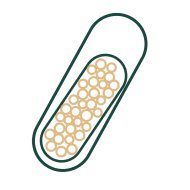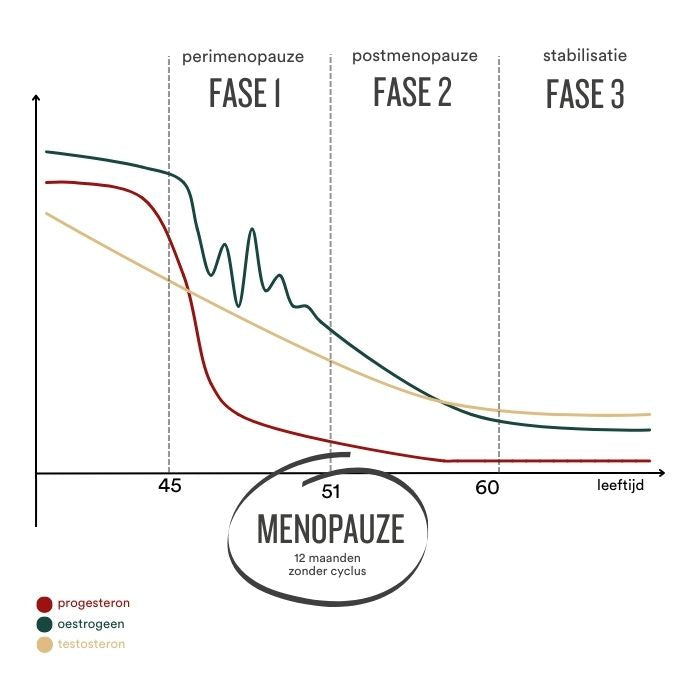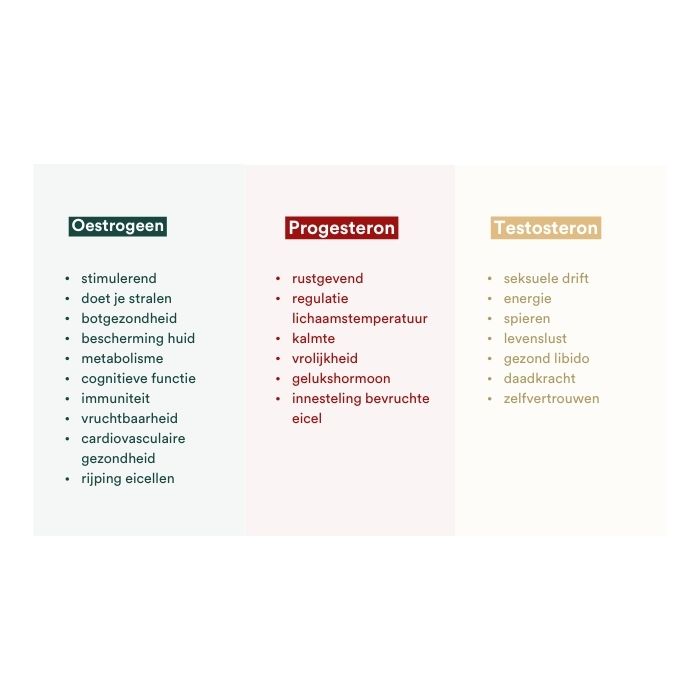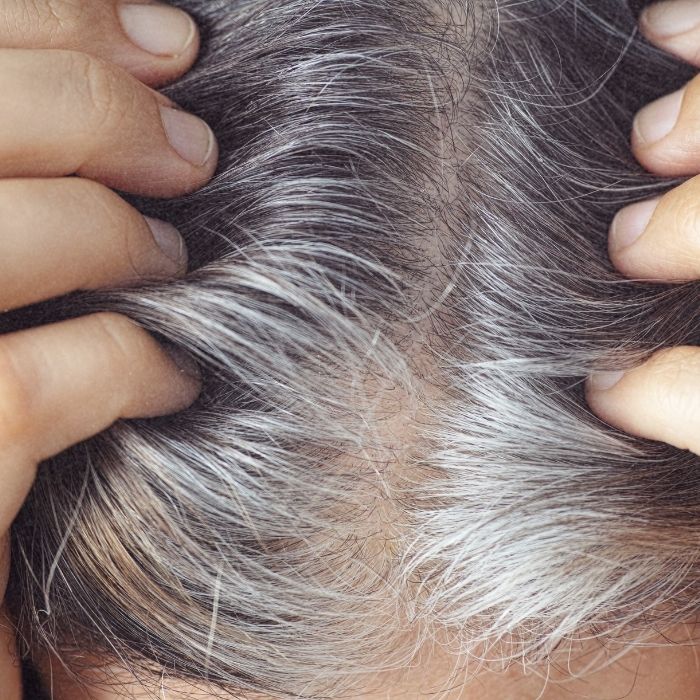
Do you have questions?
Need additional advice? No problem! Ask our team of experts. We'd love to hear from you.

In recent years, scientific knowledge about menopause has increased enormously. Scientists continue to search for the very best ways to keep women healthy, beautiful, and attractive for as long as possible. And above all: symptom-free. The discomfort that certain symptoms can cause can be immense. Especially when several symptoms occur together, the impact on quality of life is often significant.
If you suspect you are in perimenopause, be sure to discuss it with your doctor.
There is also much you can do yourself to get the most out of this stage of life. This blog provides you with the tools for an integrated 360° approach, with advice on nutrition, exercise, and lifestyle in general.
Every menopause experience is individual, and your approach should be personal too. It’s also important to understand that it’s always a combination of factors. Your lifestyle matters greatly, but ideally you work in a multidisciplinary way with your doctor or gynecologist. Always look at the bigger picture.

Menopause is the point when a woman’s menstrual cycle stops permanently. It is a natural stage of life that usually occurs around the age of 51. Officially, menopause is defined as having gone 12 consecutive months without a period. The moment itself is just a single point in time. The surrounding period, in which hormonal changes cause a range of symptoms, can last for years.
During this stage, the production of the sex hormones estrogen and progesterone in the ovaries decreases. This affects many processes in the body: from temperature regulation to bone density, from mood to skin condition. The impact can be not only physical but also emotional and social. Some women experience almost no symptoms, while others face hot flashes, insomnia, mood swings, weight gain, vaginal dryness, fatigue, or even depressive feelings and panic attacks.
As nutrition scientist Amandine De Paepe puts it:
“I always compare menopause to reversed puberty. As a teenage girl, you suddenly face a huge surge of hormones and your body seeks balance. Menopause is the same process, but in the opposite direction.”
We can distinguish three crucial stages. Not every woman goes through these phases in exactly the same way, but broadly speaking, there are three important stages:
Average starting age: 45 years
Characteristic: hormone levels become erratic and gradually decline.
Women may experience irregular periods: heavy bleeding one month, very light the next, or sometimes no period at all.
This is the phase when most menopausal symptoms appear, such as hot flashes, night sweats, weight gain around the abdomen, mood swings, and accelerated skin aging.
Average starting age: from 51 years
Characteristic: your body needs time to adapt to permanently low hormone levels.
Some symptoms can persist for years, such as insomnia, vaginal discomfort, or fatigue.
Average starting age: from 60 years
Your body has adapted to the lower hormone levels and has found a balance. Most menopausal symptoms have disappeared.
The main signs at this stage are increased abdominal fat and faster skin aging.

Hormones are chemical messengers that travel through the blood to regulate many functions in the body. During (peri)menopause, it is especially the balance between estrogen, progesterone, and testosterone that changes.
When the production of these hormones declines or becomes imbalanced, symptoms may occur. As Dr. Marijke Aerts sums it up:
“The most important thing is that your hormones are in balance; otherwise, many symptoms can arise.”
There are many uncomfortable signs women may experience during menopause. Below is a list of symptoms that often occur.
Hot flashes and night sweats are, for many women, the first clear signs that their body is entering menopause. These troublesome symptoms can significantly disrupt daily life.
A hot flash usually feels like a sudden wave of heat starting from the chest or face. The skin may turn red, the heart beats faster, and sweating begins abruptly. Sometimes they last only briefly, sometimes several minutes. Frequency varies: in some women, only occasionally; in others, several times a day and night.
At night, we speak of “night sweats.” These manifest as intense sweating that wakes you up in damp pajamas or wet bedding. This can seriously affect sleep quality, leading to fatigue, irritability, and concentration problems during the day.
The cause of hot flashes is the drop in estrogen levels, a hormone that plays a role in temperature regulation. With less estrogen, the body mistakenly believes it needs to cool down, even when it’s not necessary.
Although hot flashes and night sweats are typical of menopause, they are not equally severe or frequent for everyone.
Fortunately, there are ways to limit the impact: breathing exercises, avoiding certain foods (such as spicy dishes or caffeine), keeping a cool bedroom, wearing loose, breathable clothing, and using lightweight bedding. If symptoms persist or are very disruptive, a doctor can advise on medication or natural alternatives.
During menopause, many women notice changes in their emotions: irritation, sadness, or feeling overwhelmed, often without warning. Mood swings are among the most common symptoms in the menopausal years.
Poor sleep worsens this, as night sweats or other sleep problems leave you tired. That fatigue can amplify emotions, and if you also have physical discomfort like headaches or muscle aches, it’s no surprise irritability increases.
Realizing your last period has passed can also be emotional. It’s a transition in many senses. Some women feel loss or fear, others feel liberated.
And that difference? That’s normal. No two women experience menopause the same way. One woman barely notices it, while another may struggle for months or even years with emotional swings.
The key is: you don’t have to carry this alone. Talk about it, seek support, and explore what works for you. Sometimes an open talk with your doctor is enough for clarity. Lifestyle adjustments such as nutrition, movement, and rest can make a real difference.
Your body is doing what it’s supposed to do. It’s not broken. It’s simply looking for a new balance.
Sleep may once have been effortless: you lay down, fell asleep, and woke up hours later refreshed. Then, without warning, it changes. You may lie awake for hours or wake repeatedly for no reason.
Insomnia is a silent, exhausting complaint for many in (peri)menopause. The frustrating part is wanting to sleep but not being able to relax, or the mind wanting sleep but the body staying restless.
These issues often connect to hormonal changes. Declining estrogen levels and shifts in processes you’ve long taken for granted. Your temperature fluctuates, your mood shifts, and your sleep rhythm gets disturbed.
As mentioned earlier, insomnia also affects mental health: it can make you more emotional, sensitive, or anxious. Memory lapses and forgetfulness may creep in.
Your age also plays a role in this. Not because it’s about “getting older,” but because it coincides with other changes: children leaving home, your body feeling different, or your skin becoming less supple. It’s a major transition, both literally and figuratively.
What helps? Routine. Calm evenings. Less screen time before bed. Light dinners. Sometimes simply accepting your body needs time to adjust can help, while also seeking solutions if needed.
Be aware: insomnia is not something to simply ignore. Sleep deprivation increases the risk of other complaints, both physical and mental. So don’t just put up with it. Discuss it with your doctor or a specialist. There are gentle remedies available, and in some cases HRT (hormone replacement therapy) may be considered.
Listen to your body. It sends signals for a reason.
You’re in the middle of a conversation and suddenly you can’t remember what you were about to say. Or you’re flipping through a document, reading the words, but they don’t really sink in. Finding focus suddenly becomes difficult. Your thoughts wander. Even simple tasks seem to drain your energy.
Difficulty concentrating is one of those symptoms that isn’t often talked about. Yet it’s quite common for women going through menopause. It creeps in. At first you notice it now and then, but over time it happens more often. You have no idea why you’re suddenly so forgetful, or you start worrying that something more serious might be going on.
In many cases this is linked to hormonal fluctuations. The exact cause isn’t always clear, but the drop in estrogen levels does seem to affect how your brain functions. Your mental clarity is simply… cloudier than before. That’s not your imagination, it’s a real change.
Fatigue, poor sleep and mood swings can also play a role. Everything is connected. The flow of your day changes when it’s harder to stay focused, and that can affect your confidence. You start wondering if you’re still sharp enough, if you can still handle everything.
Some women describe it as “brain fog.” It’s not just about forgetting things, but about a kind of mental sluggishness. Slower to switch between tasks. Less overview. That can be challenging if you lead a busy life, balancing work with caring for others, while those around you may not know or understand what’s going on.
These forms of memory and concentration issues are more common than you might think. They say nothing about your intelligence or abilities. It’s simply a different way of functioning during a period full of changes.
What helps? Structure. Taking breaks. Doing one thing at a time. Not being too hard on yourself. If you notice it’s really affecting your daily life, you might want to seek support. Sometimes a medical check is useful, especially if other symptoms are building up. In other cases, relaxation, exercise or mindfulness can already make a difference in how clear you feel.
It is not a subject people easily talk about. Yet many women after menopause experience symptoms such as vaginal dryness, burning sensations, or painful intercourse. What many people do not know is that this is not only unpleasant, it also has a name: vaginal atrophy. A medical term, but the experience itself is very personal.
The drop in estrogen affects the mucous membranes in the vagina. They become thinner, drier, and less elastic. What once felt natural can now sometimes feel sore or uncomfortable. Even everyday activities such as sitting, moving, and exercising can suddenly cause a burning sensation.
It can also affect how you feel as a woman. The intimate area is, after all, inseparable from your self-image, your relationship, and your sexuality. Many women remain silent about it, out of shame or because they think it “just comes with the territory.” But these symptoms can cut deeply into the sense of connection, with yourself and with your partner.
There are also other factors that can worsen the discomfort. Think of drier skin, less natural lubrication, or changes in the bacterial balance. This combination increases the risk of irritation or small tears, especially during intercourse.
The term “atrophy” may sound severe. In practice, there are fortunately many ways to address it. Vaginal lubricants and gels can provide relief. There are also specific creams or hormonal applications that work locally without affecting the rest of your body. For women with severe symptoms, a doctor may consider a vaginal estrogen treatment, which can be in the form of a suppository, cream, or ring.
What is important is that you do not have to keep living with this. And you are certainly not the only one. The more women talk about this, with each other or with their doctor, the more normal it becomes.
A decreased desire for sex or reduced libido is another common complaint. During and after menopause, many women notice that their libido changes. What once felt natural is now a vague memory. And the frustrating thing is: you do not always know why.
Sometimes it is a matter of physical change. The vagina feels different—drier, less sensitive. But there is also a lot going on mentally. Your body changes, your mood fluctuates, and you experience a different kind of connection with yourself. It is not always visible to the outside world, but the loss of desire can quietly erode your self-confidence.
Psychological changes also play a role. Think of less spontaneity, insecurity about your appearance, or reduced energy. You certainly do not have to be experiencing problems in your relationship to feel it. It often lies deeper, in your own experience of intimacy.
In addition, your sleep quality is often worse, you may have other complaints, and daily life simply goes on. There is little room left for relaxation, let alone desire. The combination of both physical and mental strain makes your libido seem less of a priority.
Still, this is not the end of your sex life. There are therapies that can help you reconnect with your body and your partner. Sometimes this happens through conversations, sometimes with exercises, and sometimes with medical support. Think of local products that can ease vaginal changes, or lifestyle adjustments that support overall health and hormonal balance.
Which form of help is right varies from woman to woman. For some, talking is enough. For others, a treatment option such as vaginal therapy or a natural remedy provides the solution. What matters is that you give yourself the space to take this seriously.
You are not “less of a woman” because of a reduced libido. Your body is simply speaking a different language than before. Listen to it, without judgment.
We have already discussed a number of uncomfortable symptoms. However, weight gain is one of the most talked-about and frustrating symptoms on the list. The kilos creep on without you suddenly eating more, and you feel powerless. Where in the past a few weeks of being careful could already make a difference, now nothing happens.
The cause is not a single factor. It is a combination. Metabolism slows, which means you burn calories less efficiently. Your fat storage also changes. Fat settles more quickly around your abdomen and waist, even if your eating and exercise habits stay the same. The typical female pear shape changes into more of an apple shape. All of this happens at a time when your body is already busy adjusting to fluctuating hormones. Around this period, the ratio between muscle mass and fat mass changes, which affects your energy expenditure.
Lack of sleep, stress, and mood swings can also lead to changes in eating behaviour. So it is not only a physical story but also a mental one.
There are ways to approach this consciously. Light strength training helps to maintain muscle mass. Healthy foods such as plenty of fibre, green vegetables, and protein support your metabolism. Fewer quick sugars, more rest in your day; every little bit helps.
For some women, hormone replacement therapy (HRT) is an option, especially if there are also other symptoms such as hot flashes or sleep disturbances. The goal is not necessarily weight loss, but a better overall balance in the body.
A healthy BMI is a guideline, but not a decisive number. Body composition, such as the ratio of fat to muscle, is much more important.
Important: keep in mind that weight gain can also increase the risk of certain conditions, such as heart disease or diabetes. Taking timely action, in a gentle and realistic way, can make a big difference.
Promotes weight loss⁴ without crash diets, while preserving muscle mass¹.
Listen to our Dutch podcast: “When estrogen drops, with Dr. Isabel De Smet.”

You look in the mirror and suddenly notice it: your hair seems thinner. Your skin feels drier than you are used to. Or you suddenly have small spots, flakiness, or a tight feeling. These are the kinds of changes you might not immediately link to menopause.
Hair loss is a common complaint, although few women talk about it. The hair becomes finer, falls out more easily, and grows back more slowly. It often starts at the hairline or on the top of the head. Although it is not sudden baldness, it can still be quite confronting.
The reason? Once again, those declining estrogen levels. Estrogen protects hair follicles and stimulates hair growth. When that falls away, other hormones (such as androgens) gain more influence. This can lead to hair loss or changes in hair growth, sometimes even in unwanted places such as the face.
The skin also undergoes changes. Less collagen means less elasticity. Your skin loses volume and feels tight or dry more quickly. Some develop pigmentation spots or sensitive skin. All of this can be frustrating, especially if you have never had skin problems before.
Did you know? In the first 5 years after the onset of menopause, the collagen content in the skin decreases by as much as 30%.
Discover the Insentials Advanced Skin Booster pack with collagen, for the menopausal skin.
Discover Insentials Hair Strength+ for hormonal hair loss.
Did you know that your liver plays a crucial role in your hormonal balance? The organ breaks down excess hormones and helps remove them from the body. An overloaded liver - caused by too much sugar (or sugar substitutes), alcohol, stress, or medication - can worsen hormonal imbalance during menopause.
According to Dr. Aerts:
“A healthy liver is crucial to staying in balance during your (peri)menopause. Although the liver itself does not produce hormones, this organ does play a role in maintaining hormonal balance.”
A healthy liver not only supports your hormone regulation, but also helps break down waste products, regulates your blood sugar levels, and contributes to healthy skin.
The health of your liver gives a very good indication of how healthy your lifestyle is: stress, oversized portions, too much fat and sugar, alcohol… these are all factors that impact your liver.
“If you adjust your lifestyle, the health of your liver will automatically improve. This will ultimately have an impact on your hormonal balance during (peri)menopause.”
It all starts with the liver. Discover the Peri Menopause pack with Detox Boost, to support the liver.
Do you suspect you might be in menopause? This checklist can help you identify typical symptoms. Filling it in can also be useful when preparing for a consultation with your GP, gynecologist, or menopause consultant.
Now count the number of statements that apply to you:
1) Fewer than 3 symptoms: little or no complaints
It seems that you are currently experiencing little or no symptoms typical of menopause. Are you 45 years or older? Then it is possible you are going through menopause without complaints. Lucky you! On average, it is estimated that about 75–85% of women will experience some form of menopause symptoms.
2) More than 3 symptoms: you may be in the early stage of menopause
But you are not alone! On average, it is estimated that about 75–85% of women will experience some form of menopause-related complaints.
3) More than 9 symptoms: clear imbalance
There is clearly a hormonal imbalance. In some cases, these symptoms can have a strong impact on your quality of life. In that case, we always recommend consulting your doctor.
As mentioned earlier, in cases of severe symptoms, HRT can be effective. This consists of estrogen, sometimes in combination with progesterone or an LNG-IUD. It can help reduce hot flashes, vaginal dryness, sleep disturbances, and bone loss. However, it is important to discuss the risks and benefits with your GP or gynecologist.
Alternatives include cognitive behavioral therapy, plant-based remedies such as phytoestrogens (soy, red clover), and specific medications for hot flashes. For vaginal dryness, lubricants or local estrogens are available. Discuss the possibilities with your doctor.
Dr. Aerts: “In terms of eating habits, I recommend not only looking at the right quantity. Because muscle mass decreases, for example, it is important to check whether you are consuming enough protein. I also always recommend eating enough fiber. That means plenty of vegetables and wholegrain products.”
Sometimes we are so strict with ourselves that it causes stress if we “indulge.” A simple rule to help with this is the 80/20 rule: if you make responsible choices 80% of the time, you can enjoy that cookie with your coffee or a glass of wine with dinner the other 20%.
Combine cardio (walking, cycling, swimming) with strength training to support bone density, muscle mass, and metabolism.
Look up a few good strength exercises and repeat them daily at home. All you need is a mat or a towel.
Try to incorporate movement at a fixed time. That is the easiest way to develop new habits. For example, we are fans of daily movement after meals: take a 20-minute walk. This also boosts your digestion. Win-win.
Reduce stress through breathing exercises, meditation, yoga, or walks in nature. Stress can worsen hot flashes and insomnia.
Menopause brings changes, both physical and mental. But you do not have to go through it alone. With small adjustments and the right support, you can already go a long way.
Our supplements provide targeted support during this stage. Practical, natural, and tailored to the needs of women in menopause. Be sure to also discuss treatment options such as hormone therapy with your doctor in cases of very severe symptoms. As mentioned at the beginning, menopause requires a multidisciplinary approach.
Give your body what it needs. This will help you keep your body in balance, even when everything is changing.